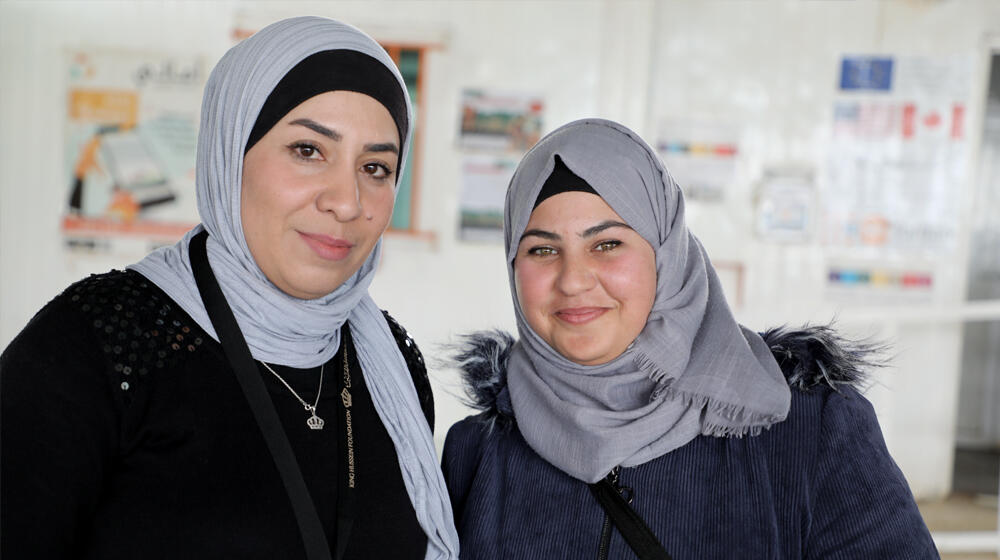Hajer, a 24-year-old Syrian refugee, who spent half of her life in Zaatari camp, never imagined that one day she would find herself battling against rumors maliciously spread by a male neighbor attempting to tarnish her reputation.
Living in a cramped caravan with her mother, three children, and six siblings, her daily life is incredibly challenging, further complicated by her three-year-old daughter's kidney disease and temper, and an older sister who is wheelchair-bound.
Her husband works as a day laborer outside the camp to support their family and his parents.
In a kind gesture, a neighbor, Salwa, offered Hajer to use her caravan when she stays with her elderly parents outside the camp. She wanted to give Hajer some much-needed privacy when her husband visits her and ease the overcrowding in her family’s home.
But this compassionate gesture stirred the resentment of another neighbor, who seemed to have his sights set on claiming the caravan for himself.
“He began spreading rumors that strange men visited me at the caravan and filed a complaint with the local police trying to ruin my reputation,” Hajer said, sitting at the Women and Girls Safe Space (WGSS), a UNFPA program against gender-based violence (GBV).
“I was shocked and hurt. I have been living at the camp since I was 12, but I have never faced anything like this in my entire life.”
Hajer faced psychological violence, a prevalent form of GBV, often exacerbated in a protracted conflict. The prolonged displacement is significantly affecting women and girls in Jordan, not only within the refugee communities but also among the host population, by increasing their risks and exposure to GBV.
Despite the hurtful rumors, Hajer stood firm, refusing to succumb to the falsehoods, especially in a society where a woman’s reputation is held in high regard.
“I wanted to confront the neighbor and my family supported me,” she said. But I did not know who he was at first. I was baffled and did not know where to go and what do. I was also afraid if I file a complaint that there will be consequences and that people will judge me.”
A few weeks before her ordeal, Hajer remembered that two representatives, going door- to-door to raise awareness about services offered at the WGSS in the camp, visited her and informed her about the services.
The UNFPA-supported space, run by the Institute for Family Health (IFH), provides survivors of GBV psychosocial support sessions, referrals to different services including sexual and reproductive health and legal assistance. They also include income-generating, recreational and empowerment activities. In 2023, the services reached XXXXX beneficiaries. They are crucial for women who are exposed to different forms of gender-based violence.
So Hajer decided to give it a try.
Upon assessing her case in utmost confidentiality, Khuloud Shedifat, the case manager devised a tailored treatment plan for Hajer, which included emotional discharge sessions and individual counseling.
“When Hajer came to me, she was worried and stressed. She told me that reputation at the camp was sullied, and that people started talking about her,” Ms. Shedifat said. “The psychosocial support sessions helped change her mood and boosted her self-confidence.
She was also in need of a legal consultation. Hajer was referred to the Arab Renaissance for Democracy and Development, a local NGO that provides legal aid.
“I consulted a lawyer, and we followed up with the local police at the camp. We found out which neighbor filed the complaint, and I confronted him in front of the police. They warned him to stay away from me and made him sign a pledge not to harm me,” she said.
The legal service provided played a significant role in Hajer's situation, effectively putting the neighbor in his place. It also underscores the importance of legal support in empowering women.
Concurrently, the psychosocial support Hajer received proved to be life-changing. “I felt empowered and became more confident,” Hajer said.
“I poured my heart out to the case manager. She made me feel at ease,” she said. “The psychosocial support was a big help.”
Ms. Shdeifat, along with two other case managers, provide critical support to 20 new cases a month and at least 50 others requiring ongoing follow-up.
Ms. Shedeifat highlighted that most of these women face different kinds of violence, compounded by financial abuse, the stress of childcare, mistreatment by their husbands which includes restricting their access to their phones, expressing their opinions and exercising their rights in choosing family planning methods. Sadly, the financial situation is exacerbating GBV.
As for Hajer, after her healing journey, she joined the IFH since the beginning of this year, going from door to door encouraging other women to seek the WSSG services.
“At first, people become surprised when I bring up the topic of psychosocial support. They worry that others will think of them as mentally ill and in need of medication,” she said. “But I say to them, ‘Look at me, we all need the support of a specialist and I share my experience with them, telling them how the sessions empowered me and strengthened my confidence in order to inspire them.”
EU Humanitarian Aid is the kind donor that supports the Reproductive Health Clinic as well as the Women & Girls Safe Space in Zaatari Camp.


